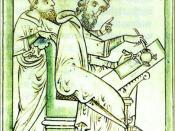A true mirror to the visage of humanity and its qualities and downfalls, The Trial and Death of Socrates, by Plato, uses its complex and profound themes to create a stark image in the mind of the reader and presents many simple to complex, controversial issues that the human race only pretends to understand, yet acts on. The book itself was written nearly two thousand and four hundred years ago in ancient Greece, yet it still can point out today's problems as well as occasionally offering to the reader solutions to its grievances. Plato, when writing out this segment of history, selected mostly the dialogue of Socrates to his followers and opponents; in doing so, he voiced his own opinions of society as suggestions to both the spoken to and the reader at once.
For Plato and Socrates, detractors of trial and analysis so often times held in the human fist, logical argument is the chief method to solve the numerous differences in thought and belief that occur in the story.
These discussions make up most of the book and advance the plot as well as advancing the reader's enlightenment towards topics that were previously not thought of. The idea behind the arguments is to draw knowledge and understanding out of the person who Socrates is speaking to, with the confidence that the other can already understand but simply has not had the experience to realize it. So often throughout the story, Socrates is faced with a situation that he feels must be rectified, but it is often one that would go nowhere with commonplace bickering, which in turn might also lead to outright violence. Instead of approaching these situations in the former manner, Socrates uses a method of suggestion instead of forcing ideas, truths, and premises...


